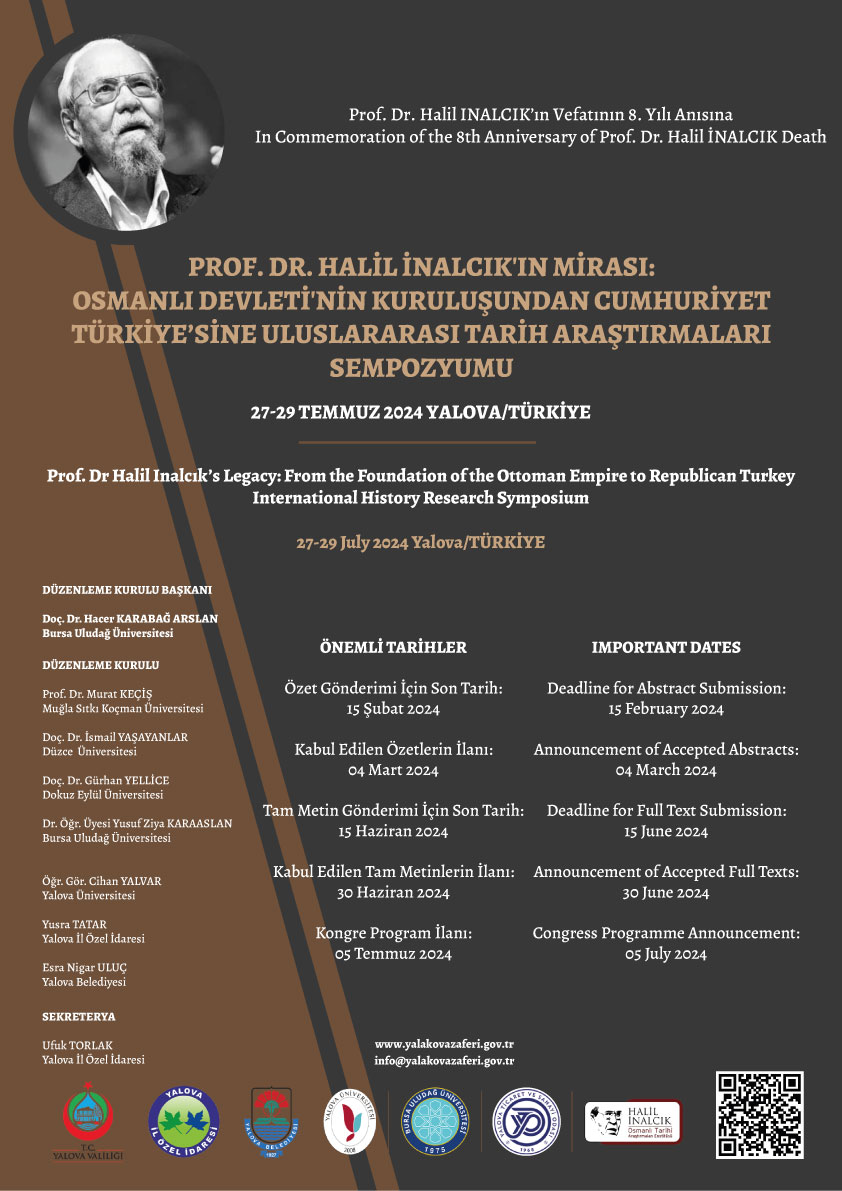Since 2009, various symposiums and panels have been held in Yalova on 27 July, the anniversary of the Battle of Bapheus (Koyunhisar-Yalakova), in order to keep alive the academic legacy of Prof. Dr. Halil İnalcık and to contribute to historical research on the Ottoman and Republican periods. Halil İnalcık himself participated in the first two of these events. The aforementioned events are organised under the leadership of the Halil İnalcık Institute of Ottoman History Research, which was established after the first meeting in 2009, with the support of Yalova Governorship, Yalova Special Provincial Administration and Yalova Municipality.
This year’s event is envisaged to be held as an international symposium between 27-29 July 2024 in Yalova, which stands out with its cultural richness and natural beauties.
“Prof. Dr. Halil İnalcık’s Legacy: From the Foundation of the Ottoman Empire to Republican Turkey” will be held in Yalova on 27-39 July 2024. This symposium aims to keep alive the cherished memory of Prof. Dr. Halil İnalcık, one of the doyens of Turkish historiography, and to encourage academic dialogue and cooperation in these fields by supporting research on the history of the Ottoman Empire and the Republic of Turkey.
The symposium aims to address a broad historical period from the foundation of the Ottoman Empire to the Republic of Turkey, inspired by the works of Prof. Dr. Halil İnalcık. Inalcık, as one of the pioneers of Ottoman historiography, analysed the social, economic, political and cultural structure of the state in depth. His studies cover a wide range of topics from the daily life of Ottoman society to political decision-making processes, economic structure, cultural and religious dynamics. In particular, İnalcık’s studies focusing on the early Ottoman Empire and the classical period emphasise the centralised structure of the state, its administrative organisation and the authority of the sultan over the government. Inalcık’s studies on the Ottoman economy also address the importance of agriculture and trade, as well as the evolution of monetary and taxation systems. These studies are critical to understanding the economic foundations of the Ottoman Empire and their impact on social and political structures. On the cultural side, İnalcık has drawn attention to Ottoman art, architecture and literature, as well as the development of educational and religious institutions. These topics reveal the richness and diversity of Ottoman society and illuminate the cultural foundations of Republican Turkey. Prof. Dr. Halil İnalcık has carried out important studies on the Ottoman Empire as well as on Republican Turkey. As an academician sensitive to the social and political problems of his time, İnalcık has also written works on Turkey’s modernisation process and the early years of the Republic. These works examine Turkey’s Westernisation efforts and the effects of this process on the social structure. Inalcık also analysed Mustafa Kemal Atatürk’s reforms and their effects on Turkey. These studies of İnalcık have played an important role in the understanding of Republican Turkey and shed light on the problems of the period. In this context, the symposium aims to emphasise the historical continuity of the Ottoman Empire and Republican Turkey based on Inalcık’s works.
In addition, this symposium will be an important source of experience and motivation for young historians by including undergraduate and graduate students. These young researchers will have the opportunity to interact with experienced scholars in their fields, present their own work and gain valuable insights into historical research methods. In this way, the symposium will contribute to the training of young historians and provide a platform that will serve the continuity of historical science. In this way, the symposium will provide a broad perspective on the history of the Ottoman and Republican periods, while supporting the transfer of this process to future generations and the development of historical science.

